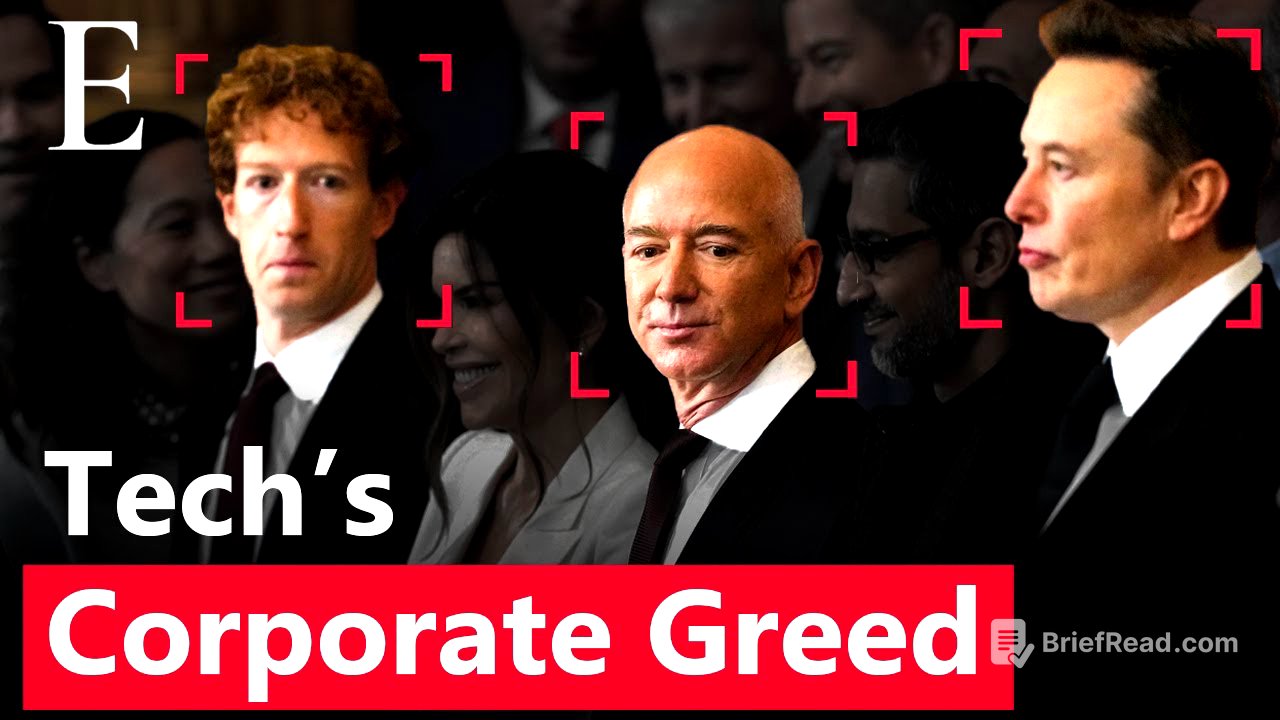TLDR;
The video discusses how corporate greed is impacting the tech job market, leading to mass layoffs and reduced employee benefits despite growing profits. It highlights the widening gap between CEO compensation and average worker salaries, using examples like BlackBerry, Google, Meta, Amazon and Axon to illustrate how companies prioritize shareholder value and cost-cutting over innovation and employee well-being. The narrative of AI-driven efficiency is often used as a justification for workforce reductions, even when the actual savings come from reduced labor costs rather than technological improvements.
- Corporate greed leads to prioritizing shareholder value over employee well-being.
- Tech companies are cutting jobs and benefits despite growing profits.
- AI is often used as an excuse for layoffs.
- CEO compensation is disproportionately high compared to average worker salaries.
Tech Jobs [0:12]
The video starts by highlighting the immense disparity between tech CEO compensation and average employee salaries, noting a study indicating a tech CEO can earn in a year what an average employee makes in three centuries. This sets the stage for exploring how corporate greed influences decisions within the tech industry.
Job Market [0:45]
The discussion shifts to the broader job market, revealing that tech companies have cut over 800,000 jobs since 2019 while simultaneously increasing their profits by an average of 40%. This juxtaposition raises questions about the true motives behind these layoffs, suggesting that factors beyond technological advancements may be at play.
Corporate Greed [1:03]
The video addresses the role of corporate greed in the tech industry, suggesting that mass layoffs blamed on AI may be an excuse for companies to reduce their workforce without damaging their image. This concern has reached politicians, who warn about the potential effects of corporate greed on the labor market and the economy.
Tech Workers [1:22]
The insatiable greed of corporations is explored, using the example of BlackBerry. Once a dominant force in the smartphone market, BlackBerry prioritized reducing operating costs and increasing shareholder value over reinvesting in innovation. This led to massive layoffs and a weakened ability to compete with companies like Apple and Google, ultimately resulting in a significant decline in sales and market share.
Tech CEO Pay [2:48]
The video transitions to discussing the lavish perks that once characterized the tech industry, which are now being questioned. The mass layoffs of the past three years have revealed that companies may not have genuine loyalty toward their workers, and many benefits were simply tools to attract and retain talent.
Tech CEOs [3:15]
Google's shift from offering numerous perks to cutting back on them after announcing layoffs is examined. Free lunches were eliminated, travel expenses were restricted, and internal celebrations were paused, all under the pretext of operational efficiency. This resulted in a significant increase in annual profits, suggesting that these perks were more about recruitment and retention than genuine commitment.
Workforce Reductions in Tech [4:40]
The rise of artificial intelligence is presented as a convenient excuse for companies to reduce their workforce without tarnishing their image. However, this narrative rarely translates into significant operational savings, as staff cuts generate an immediate reduction in payroll, benefits, and compensations.
Tech Layoffs [6:05]
Meta Platforms' elimination of around 14,000 jobs is analyzed. While the company claimed that AI would improve efficiency, experts noted that the real savings came from reduced salaries. The company managed to increase its net profits by more than 20% during that period, demonstrating that the layoffs were more related to margin optimization than to operational improvements. Google followed a similar pattern, cutting approximately 6% of its workforce while reporting increased revenues.
Automation [7:28]
The video highlights the extreme disparities in CEO compensation compared to average worker salaries, using examples like Axon Enterprises and Amazon. The CEOs of these companies received compensation packages thousands of times higher than the average salaries of their employees. This inequality is exacerbated when top executives receive record bonuses for meeting efficiency goals, which often means laying off more people and reducing labor costs.
Tech Employee Benefits [8:12]
The video concludes by noting that the tech sector, once seen as a driver of global prosperity, has become a main engine of structural inequality. Technology, which once promised to free people from repetitive tasks, is now being used as an argument to eliminate them.









